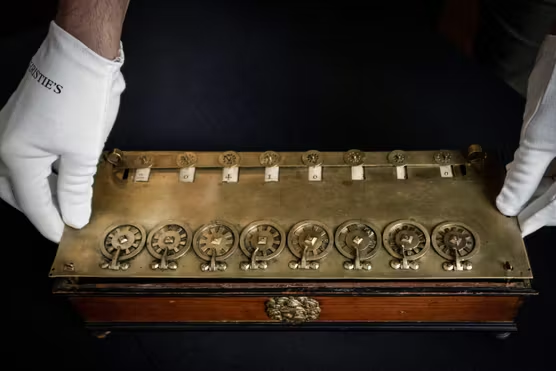Christie’s has suspended the planned Paris auction of a rare 17th-century calculating machine created by Blaise Pascal, following a court decision that temporarily blocks the piece from being exported outside France. The move has sparked renewed debate over the protection of national scientific heritage.
The auction house had been set to offer the historic device, known as La Pascaline, on Wednesday afternoon. However, just hours earlier, a Paris administrative court suspended the export authorization issued earlier this year, making it impossible for buyers to take the object abroad.
The Pascaline on sale is one of only nine surviving examples of Pascal’s groundbreaking machine, and the only one believed to remain in private hands. The others are preserved in museums. Christie’s had estimated its value between €2 million and €3 million, calling it “the most important scientific instrument ever offered at auction.”
In a statement, Christie’s confirmed it had paused the sale at the request of the seller after the court’s provisional ruling. The item was part of the library collection of late French collector Léon Parce.
“Pending the final judgment, given the provisional nature of this decision and in accordance with the instructions of its client, Christie’s is suspending the sale of La Pascaline,” the auction house told Agence France-Presse.
The suspension followed an urgent appeal by scientists and researchers who argued the machine should remain in France and be formally classified as a national treasure. Such a designation would prevent its export and ensure it remains accessible for research and public preservation.
The culture ministry defended its earlier decision to grant an export certificate in May, stating that the procedure followed standard protocols. Two experts — one from the National Centre of Arts and Crafts (CNAM) and another from the Louvre Museum — had supported the authorization.
However, researchers contend that the Pascaline’s historical and technological significance warrants stronger safeguards. Created in 1642, the machine represents a milestone in the history of computation. Blaise Pascal, then just 19 years old, designed it to help his father manage complex tax calculations while overseeing fiscal administration in northern France.
Christie’s described the device as “the first attempt in history to substitute the work of a machine for that of the human mind,” highlighting its impact on the emergence of mechanised calculation. Decorated with ebony and precisely engineered metal components, the Pascaline stands as an early precursor to modern computing.
The court’s final decision could take months, leaving the future of the machine uncertain. If the export authorization is ultimately annulled, French authorities may move to acquire the piece for the national collection. If the suspension is lifted, Christie’s could reschedule the auction for an international audience.
For now, the rare Pascaline remains in limbo — an object caught between private ownership, soaring market demand, and a growing movement to protect France’s scientific and cultural heritage.
